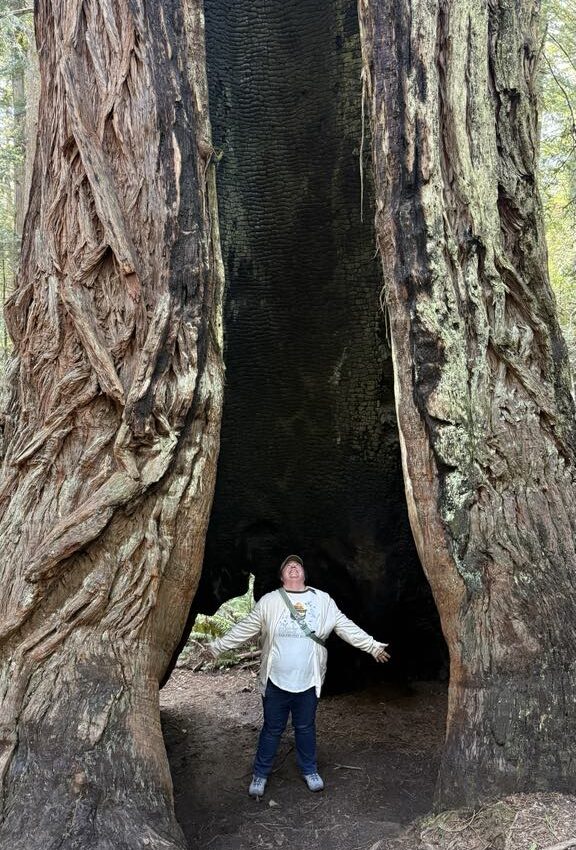This poetry writing is a bitch.
I mean really. You get an idea and you rush to get it down on paper—because, you know, if you put it off, it’s gone. Gone, nowhere to be found again. I heard that Arlo Guthrie (and who knows if he really said this) said creativity is like floating down a river: if you pass a certain spot you have to grab it because there’s no going back. Have you found that too—perhaps waking in the middle of the night and you hear inside your head that one fabulous line? It’s a keeper, you’re probably thinking, the beginning of the poem of your career. But it’s dark outside, you’re exhausted and so you repeat the line over and over again knowing you could never forget this incredible line, and before you know it, you’re fast asleep. In the morning, yawning and stretching to begin the day, the essence of that line just hovers to the left of your consciousness, and like one of those dreams that you just can’t recall, that magnificent line, that line that begins the poem of all poems is gone, having disappeared in the miasma of sleep. And if you’re like me, you mourn the loss.
But this is just one of those poetic moments that makes you wring your hands in anguish. Sure, you keep a pencil and pad of paper by your bed so that the line disappearing act never occurs again. And sometimes you can get yourself going, turn on the light, write down the brilliant line, and satisfied, find yourself fully awake, with no prospect of getting any shuteye. Argh!
But then even when you write it down, morning brings a new perspective and what seemed so brilliant at 3 a.m. is pretty ordinary in daylight; in fact, it’s downright pedestrian and you crumble it up and toss it in the circular file. So the goal is to grab an idea—a line, a word, a thought, before it drifts away. Forget being critical. Just grab—or you’ll be floating down the river with nothing.
Which brings me to throwing up.
I absolutely believe when that idea comes floating down from the heavens just write. Don’t wait, don’t put it off, but certainly don’t critique your idea, or the words, or the grammar, or the structure. In fact, flick off that critical voice that invariably sits on your shoulder and makes mincemeat of your writing. Bug off is what I say. Sometimes I know exactly what a poem will be. But more often I have found that when I start on an idea I’m not sure what the poem is really about or where it’s going. So I just write…like throwing up so that you feel better. The poem already knows what it is, I just have to stay out of the way and let it be. Sometimes I simply feel like a conduit—the words flowing through me without my permission or cognition. And when I look at what I have thrown-up I have to sit back and see what the poem is saying—not what I thought it was about, or what I want it to be about; I have to become objective, as if I were not in charge. Now the poem has a life of its own, and I have to respect what it wants to be. If I start manipulating and controlling the poem to be what I want it to be, it becomes stifled and tight. For example, let’s say I start to write about my childhood home—I’m in that idea/throwing-up stage. When I sit back and read what’s written I find I’ve focused on my father about whom I had no intention of writing. Or I’m writing about politics and suddenly it’s a poem about disappointment. It’s hard to step back from intent, and challenge yourself to let go of control. The poem will be what it is, and sometimes it doesn’t need your permission to be that.
I have to revise?
Then there’s revising. I used to think making revisions was nit-picking all the obvious “mistakes.” Change the verb tense, word-smith each and every word, figure out where this word should go, on which line. Sure you still have to look at imagery, verb choices, lineation, even tone. You can even do each of these as a singular focus in revising.
But revising, for me, is a whole process in and onto itself. It has to do with understanding what your poem is really about, not what you want it to be, but what it is. And often the revision process takes your poem into an entirely new direction, maybe an entirely new poem. For example, one technique is to take your poem and reverse it, so that your poem becomes upside-down. The last line becomes the first, the second to last line becomes the second line and onward from there. Invariably the poem will change, often becoming more focused. Certainly as the poet you will see what you’ve written from an entirely new perspective. And that’s the idea: to look at your poem from all different angles, to analyze it (as if you didn’t write it) and make changes accordingly. Sure you still have to take out the commas, change the line length, or the spacing, find a new word that works better—but revision can be a stimulating and provoking exercise into opening your poem to a whole different perspective.
Opinions and more opinions
One last thing that I’ve learned: You know when you show your poem to your workshop group, or your special reader, or your spouse, it’s just their opinion of how they view your poem. I used to believe that there was some definitive god somewhere that had the book on what makes a good poem. The truth is there are only opinions—some have greater import than others, some help you become critical and help you grow. But the bottom line is the final judge is you. Go figure. It’s up to you to decide whether or not your poem is worthy.
And there you have it—the process of poetry that I find so exciting and provoking and entertaining and exasperating and irritating and wonderfully fulfilling. Works for me.
 Irene Thalden, presently writes and lives in St. Louis, MO. She has published a collection of her poems, Echoes of a Littered Past, and is presently working on a second collection. Her poetry has been published in Black Fox Literary Magazine and the Sentinel Quarterly Literary Magazine. In addition to writing, she also teaches poetry at Washington University’s Life Long Learning program.
Irene Thalden, presently writes and lives in St. Louis, MO. She has published a collection of her poems, Echoes of a Littered Past, and is presently working on a second collection. Her poetry has been published in Black Fox Literary Magazine and the Sentinel Quarterly Literary Magazine. In addition to writing, she also teaches poetry at Washington University’s Life Long Learning program.
Irene’s poetry appears in Issue 15 of Black Fox Literary Magazine.




I love thinking that things may be just to the left of consciousness. A perfect image!
Well said — the creative nemesis and what keeps us writing!
This essay captures many writer issues and anxieties.
Irene’s comments on ‘opinions’ is right on the mark. If you like your poetry someone else probably will too. But they may be three states away working in construction. Personally, I do not have the tools to intelligently critique poetry. Like it ‘yes’ or ‘no’.
I love the story writing process too.
Thanks, Irene!